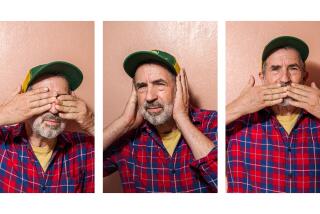Monkeys Shine : Trained Simians Excel at Performing Basic Tasks for Handicapped
- Share via
WATERTOWN, Mass. — For the last 10 years, capuchin monkeys, chosen for their small size and ability to perform simple tasks, have been working as helping hands for disabled people. But a Boston-based organization that matches monkeys with handicapped people is losing its government financing this year and now must turn to corporations and individuals for donations to continue the work.
Robert Foster’s life changed forever one rainy day 14 years ago while driving to an auto parts store. He was traveling no more than 30 m.p.h. when he lost control of his car and hit a tree.
His spinal cord was irreparably bruised and Foster woke up in his hospital bed a quadriplegic.
After several years in rehabilitation, Foster moved into a one-bedroom apartment. He was alone and nearly helpless all day, except for an hour or so in the morning and evening when a personal attendant came to bathe and feed him.
Phone Call Changed His Life
Shortly after watching a television show about the possible use of monkeys to aid quadriplegics, Foster made a phone call that changed his life again.
He got in touch with Mary Jo Willard, a former research assistant to behaviorist B.F. Skinner.
Willard, now the director of the Boston-based organization Helping Hands: Simian Aides for the Disabled, first thought of matching monkeys with the handicapped after visiting a quadriplegic in the hospital and discovering how many small tasks he was unable to perform.
Within weeks, Foster, now 32, was made a guinea pig in Willard’s fledgling program. He was matched with a capuchin monkey named Hellion, who was trained on the job and often lived up to her name. After several rocky years, Foster and Hellion are now such a team that Foster’s mother refers to the monkey as her “granddaughter.”
“She can work for me, she’s a friend and she’s good at breaking down the barriers between people in wheelchairs and people walking around,” Foster says.
Since 1979, capuchin monkeys, chosen for their small size and ability to perform simple tasks, have been placed with 15 quadriplegics around the country. The monkeys are bred at Walt Disney World in Orlando, Fla.
“She’s instant help,” says Mitch Kaufman, 34, of Portland, Ore., who has a 6-year-old monkey, Peepers.
Kaufman, who was injured in a car accident on his 30th birthday, says Peepers does most of the tasks he once had to wait hours for attendants to perform.
“I can just let her loose,” he says. “And she’s sort of like a friend but really funny. She’s somebody there that wasn’t there before. She kind of fills up a space.”
The program is designed to provide more than just technical help for the handicapped. The monkeys placed with quadriplegics often become like family, allowing quadriplegics to care for someone else instead of always being the victims, Willard says.
“The quality of their lives is so enriched,” says Willard, who financed the program herself for the first two years while working a part-time job. “It’s wonderful to see such severely disabled people get so happy and excited about something.”
‘Helping Hands” also involves foster homes around the country where young monkeys live for their first several years to grow accustomed to a home environment. They are then returned to Boston for training and placement. More than 80 young monkeys are currently with foster families, but the waiting list for monkeys numbers in the hundreds, Willard says.
Mary Ann Feller of Silverton, Ore., has taken care of Kris, a nearly 4-year-old monkey, for three years. She and her family are preparing to return Kris to Boston within the next few months.
“I think it’ll be real traumatic,” Feller says. “They become such a part of your life. But we knew it was short term. That’s why you raise them, knowing they will eventually leave to help quadriplegics. It’s like raising guide dogs. You have to think in that way or else you mourn and weep when they’re gone.”
Willard’s idea, which later became a favorite topic for television talk shows and news magazines and even the inspiration for the horror movie “Monkeyshines,” almost never came to fruition. She was turned down by 38 agencies over two years.
“It was enormously discouraging,” Willard says. “People just thought it would fail and they would be embarrassed by it.”
Press Stirred Interest
Willard was about to give up when a reporter for a medical journal spotted a paper she had written about her program. The journal ran a story on the program and other press coverage followed. Soon, Willard says, the agencies that had rejected the idea saw it as more viable.
Since then, the difference the monkeys have made in the lives of the severely handicapped has been enormous.
Foster remembers well what it was like before Hellion moved into his neat, one-bedroom apartment in a complex for the elderly in Watertown, just outside Boston. He has no mobility below his upper shoulders and uses a mouth stick to operate his motorized wheelchair.
Hellion feeds Foster snacks left by an attendant and dials a speaker phone for him. He also knows how to turn on the television, stereo and VCR.
“It used to be that if a door shut behind me, I couldn’t open it up and I’d be stuck there all day,” Foster says. “If I dropped my mouth stick, I wouldn’t be able to move from that spot until my attendant came in at night.”
Program to Lose Funding
The program, which has been financed by the Veterans Administration, loses its funding this year. Recently, U.S. Rep. Joseph Kennedy (D-Mass.) introduced legislation that would allow service-connected quadriplegic veterans to receive a monkey, much the same way they are now entitled to devices like wheelchairs and page-turners from the government.
Willard and program director Judy Zazula hope the program will receive enough sponsorship from companies like animal food manufacturer Purina Mills and individual donations to continue. At present, the program receives $300,000 in funding.
Zazula, 33, has worked with Willard from the start of the program and directs the training of the monkeys. She works 12-hour days at the Boston training center where she spends long hours in a wheelchair simulating tasks for the monkeys. Currently, there are 18 monkeys being trained at the center.
Zazula is so devoted to her charges that Hellion, Foster’s monkey, was the “flower primate” at her wedding last summer.
More to Read
Sign up for Essential California
The most important California stories and recommendations in your inbox every morning.
You may occasionally receive promotional content from the Los Angeles Times.













